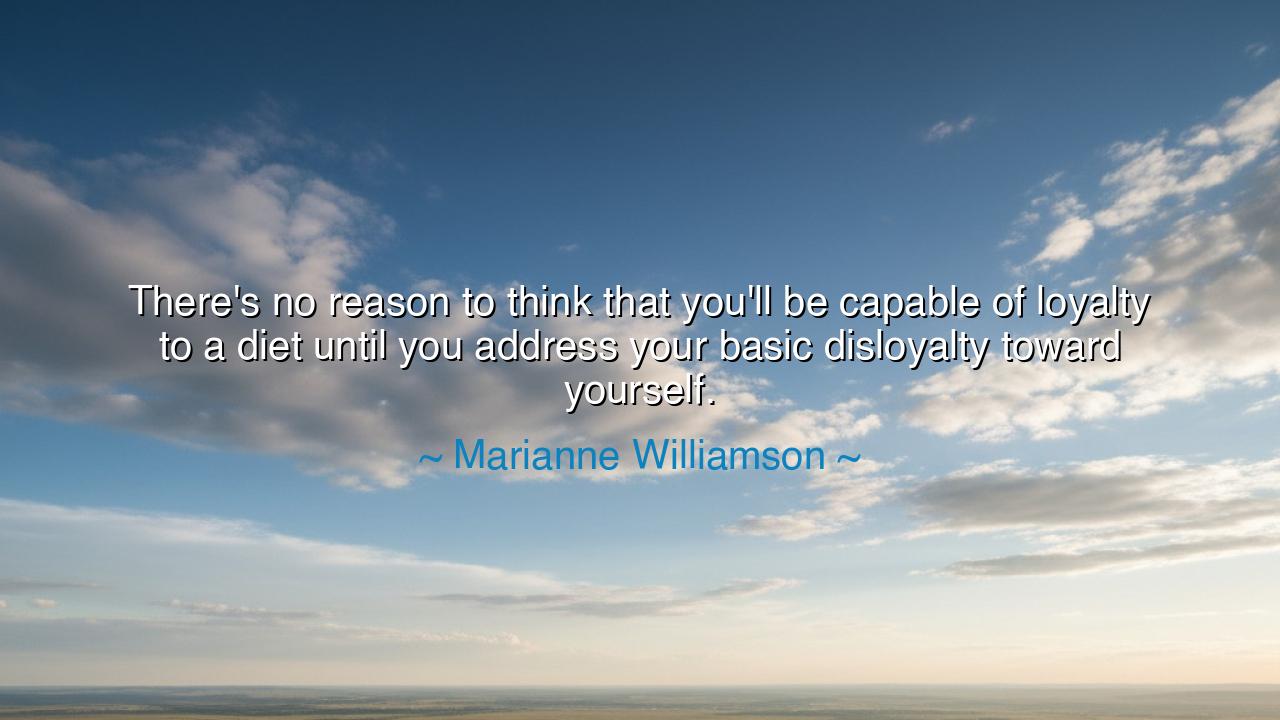
There's no reason to think that you'll be capable of loyalty to a
There's no reason to think that you'll be capable of loyalty to a diet until you address your basic disloyalty toward yourself.






Listen, O children of wisdom, and hear the truth found in the words of Marianne Williamson, for they carry within them a deep and ancient lesson: "There's no reason to think that you'll be capable of loyalty to a diet until you address your basic disloyalty toward yourself." These words speak not only of the food we consume, but of the very nature of self-discipline and the relationship we have with ourselves. For how can one be true to a diet, a commitment to nourish the body, if one has not first learned to honor and be loyal to the self, the soul that resides within?
In the times of old, the greatest warriors and philosophers knew that to be true to any cause—be it a diet, a mission, or a life path—one must first cultivate a deep and unwavering loyalty to oneself. The great Socrates spoke of the importance of knowing oneself, of understanding the inner workings of the soul before seeking to change the outer world. For how could a man lead others if he could not first lead himself? And how could he uphold a commitment, as sacred as a diet or a vow, if he had not first learned the value of his own integrity?
Marianne Williamson’s words call us to confront the deeper question: are we truly loyal to the promises we make to ourselves? When we fail to keep a commitment, whether it is to a diet, a goal, or a path we have chosen, it is often because we have not yet established the foundation of self-trust. We may promise to honor our health, to care for our bodies, but if we are not loyal to ourselves—if we fail to treat ourselves with respect and compassion—then we will falter in those promises. Disloyalty to oneself is the seed from which all failures grow.
Consider the great Alexander the Great, who conquered vast lands and sought to shape the world in his image. Yet, even he, in the midst of his triumphs, struggled with the loyalty he had to himself. It is said that in his youth, Alexander often felt torn between his duties as a leader and the distractions that came with his inner world. In the heat of battle, he was a master of strategy, but in the quiet moments of his life, he struggled with the balance of his own heart. It was only through deep self-reflection and the understanding of his own inner nature that Alexander was able to lead his army with unwavering loyalty to his cause, finding in himself the strength to conquer not just the world, but his own internal battles.
In our modern world, we too must face this challenge. Our commitments to health, to goals, and to any form of discipline cannot stand firm until we first cultivate the trust and respect within ourselves. The inability to follow through on a diet, or to remain committed to a course of action, is often a reflection of deeper internal conflict. If we do not honor ourselves—if we are not loyal to our own needs, desires, and well-being—then we cannot hope to fulfill the promises we make. It is not the external world that prevents us from success, but our own internal disloyalty.
There is a lesson in the lives of those who have overcome great challenges. The story of Nelson Mandela, for example, is one of immense loyalty to oneself and his cause. Imprisoned for years, he faced not only the oppression of his country, but also the inner struggle of maintaining his sense of self-worth. He was forced to wrestle with the question of loyalty—not just to his cause, but to the man he was within. In that crucible, he forged an unshakable bond to his principles and to the honor of his soul. His loyalty to himself was the bedrock upon which his entire revolution was built. And it was only through this profound self-trust that he emerged from prison not broken, but stronger than ever.
So, O children, the path is clear. To live in loyalty to yourself is to honor the promises you make to your soul. If you wish to be true to a diet, or to any commitment in your life, begin by first building a foundation of self-respect and self-trust. Know yourself, understand your needs, and be kind to your body and mind. When you establish this inner loyalty, all other promises will follow. For it is in the faithful tending of our own souls that we find the strength to fulfill the tasks we set before us, and it is in honoring ourselves that we can truly honor the promises we make to the world. This is the way of strength. This is the path of honor.






AAdministratorAdministrator
Welcome, honored guests. Please leave a comment, we will respond soon